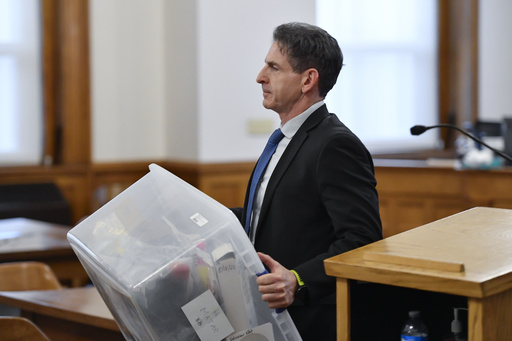
MAYVILLE, N.Y. — In an unexpected and shocking incident, Salman Rushdie, the acclaimed author, was mercilessly attacked by a masked man during a lecture in western New York. This revelation came during the prosecution’s opening statements on the first day of the attempted murder trial of Hadi Matar. Prosecutors described how pervasive confusion engulfed the scene, rendering Rushdie unable to react to the sudden onslaught.
During the trial, which marks the first face-to-face encounter between Rushdie and Matar since the knife attack that left the writer with severe injuries, including the loss of sight in one eye, the courtroom was filled with tension. The attack took place in August 2022 while Rushdie was preparing to speak at the Chautauqua Institution Amphitheater about the safety of writers.
District Attorney Jason Schmidt provided vivid details in his opening statement, recapping the speed and ferocity of the assault. Matar allegedly ascended the stage and charged approximately 30 feet toward Rushdie, initiating a flurry of stabbings. Schmidt stated that both Rushdie and the accompanying speaker, Henry Reese, were so taken aback by the brutality that they sat motionless at first.
“The assailant moved swiftly, plunging the knife into Mr. Rushdie repeatedly,” Schmidt remarked, describing the attack that targeted Rushdie’s head, throat, abdomen, thigh, and even a hand raised in self-defense. “It all unfolded so rapidly that even Mr. Rushdie and Mr. Reese did not fully comprehend what was occurring at that moment.”
It was only after some time that Rushdie managed to escape, pursued by Matar until other attendees intervened to hold him down. Reese also suffered injuries during the violent episode, receiving a cut above his eye.
Jordan Steves, a media relations coordinator for the Chautauqua Institution, testified about rushing to Rushdie’s aid upon witnessing the chaotic scene. “I ran as fast as I could, using my shoulder to disrupt what was happening,” Steves said, also identifying Matar as the perpetrator.
Matar, a 27-year-old from Fairview, New Jersey, faces charges of attempted murder and assault, to which he has plead not guilty. As he entered the courtroom, he notably uttered “Free Palestine.” Throughout Schmidt’s statement, Matar appeared composed, taking notes and occasionally smiling while conversing with his attorneys.
“This is a clear case; Mr. Matar attacked Mr. Rushdie without any provocation,” Schmidt asserted to the jurors. Rushdie, who has faced threats on his life since the publication of his novel “The Satanic Verses” in 1989, later chronicled his experience and painful recovery in his memoir, “Knife: Meditations After an Attempted Murder,” which came out last year.
The timing of the trial also coincides with the upcoming 36th anniversary of the fatwa issued against Rushdie, which formally demanded his death. For years, Rushdie lived in hiding but enjoyed relative freedom after Iran stated it would not enforce the fatwa.
Compounding the challenges for Matar’s defense, his public defender was hospitalized just before the trial commenced. Despite requests for a postponement, Judge David Foley instructed an assistant public defender to proceed. Assistant public defender Lynn Schaffer argued that the prosecution must meet a higher burden of proof beyond merely stating that “something bad happened.”
The court proceedings revealed that jurors had preliminary awareness of the case, and Schaffer emphasized that prior knowledge did not uncover the motivations behind the attack.
The trial is expected to unfold over two weeks, presenting multiple witnesses. An administrator at Chautauqua recounted handing the knife used in the attack to a law enforcement officer after retrieving it from the scene.
Matar traveled by bus to Chautauqua and is presumed to have stayed on-site the night prior to the attack. In a subsequent federal indictment, authorities contend that Matar was influenced by endorsements from terrorist organizations regarding the fatwa on Rushdie. This includes allegations of connections with Hezbollah and references made by its former leader, Hassan Nasrallah, in a 2006 speech.
Rushdie has remained a pivotal figure in literature since the success of his 1981 Booker Prize-winning work “Midnight’s Children,” and his bibliography includes renowned titles like “Shame” and the recently completed “Victory City.” His memoir “Joseph Anton” narrates his years in hiding and echoes the ongoing threats against his life.

